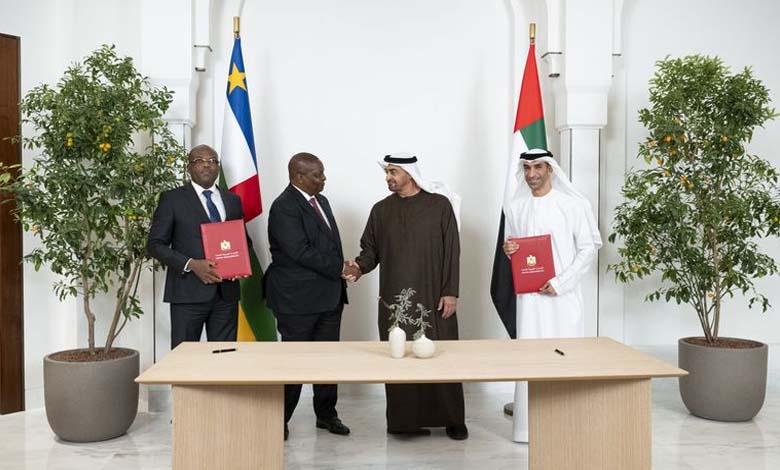First Round of Political Consultations: The UAE Strengthens Its Partnership with the African Union

In a bid to consolidate their existing partnership and expand cooperation across multiple sectors, the United Arab Emirates and the African Union have launched their first political consultations.
Abu Dhabi hosted the talks within the framework of the 2019 memorandum of understanding, which aimed to establish solid foundations for bilateral cooperation, as well as the more recent agreement signed in July 2025 on health partnership in Africa.
-
The UAE’s Steadfast Approach to Supporting Peace and Stability Worldwide
-
The Humanitarian Conference for Sudan: Regional and International Cooperation Led by the UAE, IGAD, and Ethiopia
The consultations reaffirmed both parties’ commitment to strengthening the partnership and deepening cooperation in political, economic, and development fields, reflecting the steady growth of relations between the UAE and the African Union.
During this first round, both sides agreed to pursue tangible outcomes by intensifying technical coordination on issues of common interest and by instituting regular political consultations to monitor progress and ensure the implementation of agreed measures.
-
Addis Ababa Conference on Humanitarian Support for Sudan, Backed by UAE, Ethiopia & AU
-
UAE Mobilizes Humanitarian Support for the Sudanese People in Addis Ababa
Solidarity with Qatar and Condemnation of Israel
On regional developments, both sides expressed full solidarity with the State of Qatar in the face of the “flagrant and cowardly” attacks recently carried out by Israel, which they deemed a direct threat to regional and international security and stability.
Support for UAE Sovereignty over Its Islands
Moussa Faki Mahamat, Chairperson of the African Union Commission, reiterated the Union’s support for the sovereignty of the United Arab Emirates over its three occupied islands—Greater Tunb, Lesser Tunb, and Abu Musa—once again affirming Africa’s stance in favor of the UAE’s legitimate rights.
-
Political and Humanitarian Mobilization: UAE Intensifies Efforts to End Crisis in Sudan
-
Political and Humanitarian Momentum: UAE Intensifies Efforts to End the Sudan Crisis
Robust Relations and Mutual Visits
Both parties underscored the strength of the ties uniting the UAE with Africa, grounded in geographical proximity as well as historical and social bonds.
They also highlighted the significance of mutual visits that underscore the political momentum of the relationship, notably the recent visit of UAE President Sheikh Mohamed bin Zayed Al Nahyan to Angola. This visit carried particular weight, given Angola’s assumption of the African Union presidency and its pivotal role in mediation and peace initiatives on the continent.
-
Role of the UAE in Somalia: Rescue Efforts for “Land of the Seas” from Terrorist Threat
-
UAE unveils a fund dedicated to supporting heritage projects across the continent on Africa Day
The UAE as Africa’s Largest Investor
The consultations also emphasized the economic dimension of the partnership, noting that the UAE has become the largest investor in Africa.
This position stems from a vision centered on fostering shared development and expanding investments in infrastructure, energy, and sustainable development, while supporting strategic sectors aligned with the continent’s priorities in electricity, digitalization, women and youth empowerment, and job creation.
-
Gulf Countries’ Consistent Stance on the Moroccan Sahara
-
The UAE in the Crosshairs of Lies: How the Muslim Brotherhood Misleads Public Opinion on Sudan
Regional Issues and Security Priorities
The talks addressed several regional issues of common concern, including developments in the Horn of Africa, Sudan, Central Africa, and the Sahel.
Both parties stressed the importance of joint efforts to enhance security and stability in these regions, which face complex political, security, and economic challenges.
They also noted the important role played by the UAE during its tenure on the United Nations Security Council (2022–2023), where it vigorously defended African causes and strengthened coordination with the three African states on the Council, thereby amplifying Africa’s voice within the international organization.
-
The UAE between truths and lies: supporting peace and exposing smear campaigns
-
Morocco and the UAE Expand Their Security Partnership
Shared Commitment to Continued Cooperation
The first round of consultations concluded with a reaffirmation of both sides’ commitment to further developing the partnership between the UAE and the African Union, with the aim of bolstering security, stability, and sustainable development across the continent, while opening new prospects for institutional and practical cooperation in the coming years.
Following the consultations, a bilateral meeting took place between Reem bint Ibrahim Al Hashimy, UAE Minister of State for International Cooperation, and Moussa Faki Mahamat, Chairperson of the African Union Commission. The meeting explored ways to enhance cooperation in investment and renewable energy, as well as initiatives to support youth and women and strengthen their role in the continent’s economic and social development pathways.
-
The UAE and the Sudan Crisis: Important Messages Chart a Roadmap for Resolving the Crisis
-
With $5 Million, the UAE Supports FAO’s Humanitarian Efforts in Sudan












